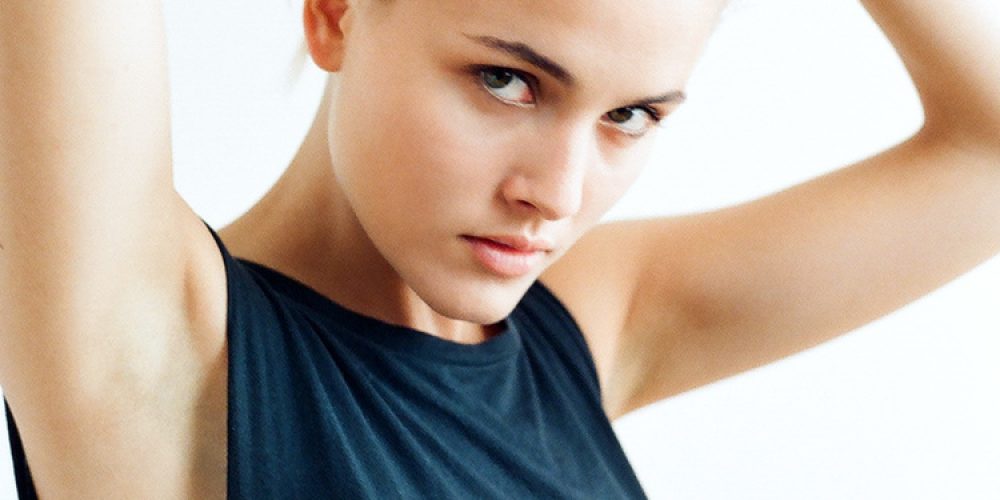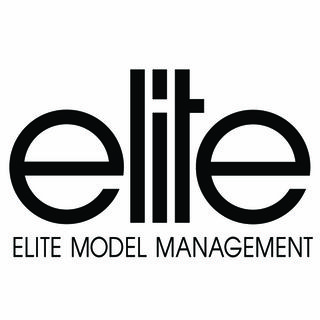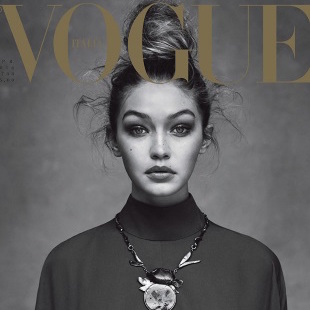Back in April, I went with a friend to watch a concert at Supermarket in Toronto. As the first band played, I noticed a woman in the crowd who I recognized immediately as a model I’d seen in magazines and through mutual friends on facebook. She turned out to be the second musical act of the night. She introduced herself as Elissa and began to play one of the best live sets I’d heard in years. As she played, her face grew more and more radiant and I knew I was in the presence of someone truly in love with their craft. She also just happens to be, as I described to my friend, «stupidly pretty.»
The Business Model: When did you first entertain the idea of being a musician?
Elissa Mielke: Probably weirdly early. My dad and I always made-up songs together, and I grew up in a church where you were put up to sing from very young. So I think it was in my nature from a very young age. In grade five, I wrote a song in math class. It was a love song and it was pretty cheesy. In middle school, I made all these press packages with all these songs I’d recorded on tapes, and I sent them out with my school picture and a typed up note to 85 radio stations. I thought that’s how you got your music on the radio! I don’t think I got any replies, but I already assumed that it was a career I could do. But I always thought that I’d be a professional musician by age fifteen, so I was surprised that it takes a lot more time. It’s funny, both the industries I’m involved in, age seems so important. I definitely think about age a lot, and I’m very aware of time passing.
TBM: Is that hard?
EM: I guess so, I think it’s made me work really hard. And I’m starting to realize that I want to always grow and learn and let every day be full of the things I love. But I am aware that I can only model for so long, and that’s how I’m supporting my music right now. I am aware of that.
TBM: That seems like a good system; modelling to support your music. It reminds me of actors who do their big Hollywood action movies so that they can also do the tiny indie films that they’re really passionate about.
EM: Yeah, I think I find it tricky to explain that I’m a musician, and I model. And I totally respect people who model full-time. But I think people don’t realize that not all models are models first. Like, if I wasn’t a model, I’d be a waitress or a receptionist. It takes over your identity more than any other job. If I say I’m a musician and I model, then people think, “Her thing is that people think she’s attractive.” But I also don’t want to be too self-pitying because modelling is a crazy amazing way to be able to support what I love.
TBM: When did you begin modelling?
EM: About two years ago. I met my mother agent through a photographer friend. When I was younger, I’d model for a couple friends who were photographers. And then there was that thing when I was fifteen. When I was fifteen there was a modelling contest. Me and a few other finalists got to go to New York and they gave us this very exciting, glamorous side of modelling. Then I came home, and signed with an agency in Toronto, but I got sidetracked by the rest of my life. And I’m glad it didn’t work out for me then. Because I don’t think the criticism would’ve been good for me at that time. I just let the contract run out.
TBM: So two years ago, where you scouted?
EM: Well, I was in university and I started to realize that university was really expensive. So when I met Chantale the timing was just perfect.
TBM: Did you ever worry that the one job might interfere with the other?
EM: Yeah, I worry a lot about that. In terms of the way that people see me. I also come from a religious background that doesn’t necessarily see the fashion industry as a place where you can be a morally sound person. But I’m very conscious of my image as a musician. When I was in New York talking to some people that could potentially help me build my career as a musician, one of the things that came up was modelling and music. They said that with writing folk music or lyrically intelligent music, I probably couldn’t model or my image would have to be very different. The example they used was, when a model is interviewed, they’re not asked about politics or feminism. But I want to be a musician who has thoughtful lyrics and I really value music that connects with people on a deeper level. So although modelling is sustaining my music career right now, it strange to think that it could compromise that.
TBM: Are you more particular about the modelling jobs you’ll do as a result?
EM: From the start there have been jobs I’ve said no to. Whether it’s because it’s a shoot that’s sexual and makes a woman look like a child, or it’s a corporation that just makes me sad. In modelling, I’m thinking about what the client wants. You are not important, their brand is important. As a musician, people have to trust your image, and your brand is so important.
TBM: So even though companies aren’t hiring you as a musician, you’re already thinking about co-branding for the future?
EM: Right. And I already know that when you Google my name, campaigns or covers that I’ve done come up. And I’d like to separate those two worlds a bit. Some days I want to stop modelling because I think it’s too risky, but then I also don’t think I could spend so many days writing or recording or performing with any other job. So, it’s a very practical thing. But usually when I see people they ask me, “So how’s modelling?” And they assume that’s all that I do. It’s so much more of a mystery to people, and there are so many assumptions about it. I always think, can I be a environmentalist if I’m a model? Can I still be a feminist if I’m a model? What jobs do I say no to as a feminist? And how often can I even know what’s going to happen when I show up on set? I try to show people that I do really care and I do really think about these things. And I think about my young female cousins. How will they think about me, and themselves, when they see a retouched photo of me? There’s so much pressure. And you’re also not a person in the same way you are in any other working environment. I find on set sometimes, if people are talking about the news or something political on set, they won’t even think to ask my opinion!
TBM: Do you find the two worlds more complimentary or conflicting?
EM: I think, on paper they compliment each other really well. Modelling allowed me to buy a keyboard. But in a practical sense and in the way people see me, I think they conflict. And it’s something that always comes up. How can people hear my music before they see me? Can someone think it’s intelligent music before they see I’m a blond woman who people find photogenic?
TBM: Do you look up to other models who have parlayed their careers into something else?
EM: There are definitely some models who have helped me be more proud of being a model, or have helped me change my own judgements! I remember seeing this one interview with Natalia Vodianova where she talked about her family, and running a marathon, and her political opinions – all the things she does outside of modelling. She said that when she does a photo shoot she sees it as if she’s playing a character; I found that really beautiful. I’ve always respected that she sees it as a career and doesn’t let people make fun of her for it. There’s also something really ugly about people deciding that because fashion is beautiful and brings people joy, it’s silly. I know sometimes it can be elitist, but in general fashion isn’t bad and it doesn’t have to be stupid. So sometimes there are notions of fashion being silly, and I think it can be redeemed. Even just talking to other models changes your view. One of the first models I met, she was a single mom, in med school, modelling to feed her three kids and pay her bills. And I thought that was amazing and that always stuck with me.
TBM: Yeah, it can be really hard to be on the receiving end of such a wide brush stroke.
EM: People like boxes. I like them too because it helps you figure out what’s bad and good. Of course, I grew up with a very strong right and wrong, so it has been hard for me to figure out what the good in modelling is. But I’ve realized that if you believe in things – feminism, environmentalism, social justice – you can uphold that in any job. You can do any job in a way that is cruel or selfish or vain, but you can also do any job in a way that is loving, caring, and that makes you a better person.
TBM: Yes, every job is so much more than what it is in theory. It’s about the relationships you make, and how you treat people, and how you feel at the end of the day.
EM: Exactly. So I’m getting closer to understanding all of that.
TBM: Your online presence is a lot more music-focused than modelling-focused. Do you have a social media strategy for representing yourself?
EM: Well, for example, all the pictures on my [music] website, they’re all pictures of me, but they’re all taken by someone I love and they’re very different than the photos in my [modelling] portfolio. And that’s a deliberate thing, because I want people to think they’re seeing more of who I am and not just a modelling character. So I try to separate the two worlds, because I think people can find it confusing. I used to wear sort of silly, colourful, not form-fitting things on stage, so I could be an entertainer and musician, not a model.
TBM: And put the casting outfit away.
EM: Exactly. I brand myself differently.
TBM: A lot of models use social media to promote themselves as models. Do you feel like you’re missing that opportunity or neglecting that?
EM: No. I mean, I have instagram and I’ll sometime post a photo of me on set or something. But those are still glimpses into my everyday life. But I do try to keep it separate because I got really sad with people saying, “She’s a model,” when I do spend most of my time writing music and really working hard on my music career.
TBM: You said that you’ve had to turn down some modelling jobs because of your beliefs and/or to keep your music image intact. Have your agents/bookers been supportive of those choices?
EM: Yeah, I’m very lucky. Sutherland’s amazing, and Chantale really knows that I’m passionate about what I do. I know people who’ve had a hard time even getting their agents to understand that they have to go to school. They’re one of the reasons why it’s such a good job for me.
TBM: So did you model while you were in university?
EM: Not really. I did some work here and there, but I was mostly getting into shape, getting healthy. Learning not to have cupcakes everyday, that cheeseburgers are not a food group – that kind of stuff.
TBM: Playing live music and modelling are both types of performance. Have the two experiences helped one another? Where do they differ?
EM: I used to see music as me being my truest self. Lately I understand that even artists who are the most honest, their lyrics were still built on worlds that they created and they still have branding that lets more people understand their identity. So I understand that being on stage and singing is still a performance. It’s me, but maybe I’m braver and I can be everything I really want to be. Modelling’s different because a team creates my identity.
TBM: What about physically? Like the way you move on stage or on set?
EM: Well I’m definitely more comfortable. And modelling’s made me a better businesswoman because I’m really interested in marketing and branding, and how other people perceive you. And also if I’m every shooting album art I’ll definitely be able to take a good photo. [Laughs] And just like how a song can be a place where people can escape and find beauty, a photoshoot can do that too. So I’m appreciating those connections.
TBM: You took a modelling trip to Tokyo last year. Do you find that that experience abroad influenced your music?
EM: Yeah, because I was in a totally different culture and the music there is different, and when you experience culture in a new way it allows you to be critical of culture in a new way. So it expanded my mind in general. I also bought a little keyboard while I was there so that I could play music there. Sitting in a new city and writing music there was very inspiring. And it also helped me realize that I didn’t want to model for the rest of my life. It was like my life here, but on drugs. You know? It was just so intense. And my insecurities and little complaints were just magnified. So I took a month off after just to not think about it for a while. Overall I felt like less of a person and more like a commodity over there. So I came sort of close to quitting after. But I find when there’s a week when I’m modelling every day, which is often the case nowadays, I just have to take some time to read or have a deeper conversation and remind myself that I’m more than just this shell my soul is in. That can be dangerous, having a job that’s too focused on your exterior.
TBM: I think any job that focuses on a trait or a skill set you don’t value can be dangerous.
EM: Yes, that’s true. Any menial task, or whatever.
TBM: During that time in Japan, did you find it difficult to work on your music?
EM: Yes, I really had no time. We were always in the van or at work. And it helped me reaffirm how much I need to work on music to feel good. But once in a while when I had time I’d lock myself in a closet and play around on my synth and try to feel like I was creating something.
TBM: Have you considered travelling abroad for modelling again?
EM: I think the opportunity to travel anywhere and not come back thousands of dollars in debt is incredible. Next time I’d have to take a three-week backpacking trip after where I can wear sweatpants and not think about how I look. Or if I had the opportunity to shoot a music video in Europe and modelling could finance that.
TBM: Yeah, you’d work so well in Germany.
EM: Yeah? Well, my first language is German, so there you go!
TBM: Many new models get into modelling to use it as a platform or stepping-stone to further their career in the cultural industries. Was this something that came into mind before you decided to give modelling a try?
EM: Well, I think I still do see it as a door that helps me move forward. Because money is so essential to getting me where I need to be. And sometimes the worlds even overlap. And it constantly makes me reassess what I believe in and how I see myself – which I enjoy.
TBM: Have you ever had any have direct confrontation from your religious community back home?
EM: I definitely took a different path from what my community expected, and a lot of people are offended by the fact that I model and write «secular» music. A lot of people are very disappointed about the path I’m taking. I grew up holding the belief that dancing was a sin, makeup was a sin, music with drums was too sensual, and that anything that draws attention to yourself is self-glorifying and vain. I’m still on a journey to find out what exactly my own beliefs are, and how my faith influences the way I present myself. Although me being a model is offensive to a lot of the people who I love and who I grew up with, I don’t think people realize just how much my past still influences my decisions, and how much I respect their faith even though it isn’t currently identical to mine. The things I learned from my church growing up still influence me- they instilled in me that clothing and fashion and beauty are all temporary and my body is a shell, or a boat for my soul, which is something spiritual- the only thing about me that I believe is eternal.
Since I believe that, I try to be thoughtful about how I present myself, and my sexuality, and my beliefs. I think and pray about those decisions, always.
And obviously there are times that I’ve done a music video or photos that someone will think are too sexy. I’ve lost close friends and received horrible messages because it hurt people, which really hurts me. But anything I put into the public eye, I do think very carefully about. I’ve said no to a lot of money because I respect myself, and sometimes to jobs I wanted to do, because I respect the faith community I grew up in.
There’s one video I did that was pretty sexy for The Weekend & Drake, and I heard all the horrible things that people said about me behind my back. But that wasn’t a flippant choice. I like his music, the song was well written and the video beautifully shot. I didn’t dance until I was 15 or so because I thought all dancing was bad. But now I love to dance. And I recognize that my body is my own- and I decide how to use it and present it, based on my own beliefs. So I did the video and I loved it- it was me reclaiming my body, and my music, and I think God understood that. And me dancing in a room full of balloons, yes in sexy clothing, but to a song that I wouldn’t have been allowed to listen to – that’s me reclaiming something that I love, and music and dance and my body and finally feeling like a part of culture that I never felt like I understood. And I’ve always had to be separate from culture- but I don’t think that’s the true nature of what is biblical. I always think about my family and community in the choices that I make. And I wish people were just as thoughtful about my feelings, as I am about theirs in every single decision that I make. I stand behind the decisions I’ve made and try to live in a loving way.
TBM: As a musician, what was it like being in someone else’s music video?
EM: I always take it as a learning experience. There are definitely times where I’m playing “the girl” in the music video, and I look at the artist and think ‘I want to be you right now!’ It’s hard to suppress everything about myself except for the way I look. I think I get frustrated because the way I look has nothing to do my inner being. If someone says, ‘I saw a billboard of you and you looked great.’ I’m like, ‘oh well, that’s not me they just painted my face and took a picture.’ That’s hard because you start to value those things yourself. So sometimes I ache to talk about the things I really care about or the book I just read. If someone wants to compliment me on my eyelashes, I really don’t care.






